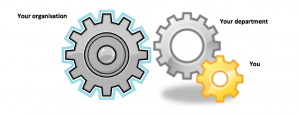BSBWOR203 – Work effectively with others
In this unit you will learn how to;
- develop effective workplace relationships
- contribute to workgroup activities
- deal effectively with issues, problems and conflict
Introduction
Relationships can be fragile– especially in the workplace where they are often built or destroyed by the actions we take. Building healthy, secure and harmonious relationships is important not only to us personally, but also to underpin the success of the organisation we work for. We need to build effective relationships for a number of reasons:
- The health of people depends on what happens in organisations and what they do. Overwork, stress, being subjected to harassment or bullying all impact on a person’s health and therefore on their ability to fulfil their role within the organisation. Staff who are stressed make mistakes costing the organisation time, effort, money and reputation.
- Organisations only function with the co-operation of their members – staff are at the coal face of the organisation, fulfilling all the functions necessary to ensure success. If there is disharmony in the workplace, this can impact negatively on the organisation’s success.
- Organisations can have a profound effect on people that do not work for them but who depend on them for the necessities of life – for example, food, housing and clean water. Well run harmonious organisations are, normally, stable and therefore also offer a stable environment to their staff and all the people who depend on them.
Develop effective workplace relationships
Building an effective relationship means listening to understand someone else’s positions and feelings. The simplest way to understand what is important to another person or to a group is to ask, then listen to the answer. We all know when someone else is really interested in us; the other person is attentive, does not interrupt, does not fidget and does not speak about him or herself. This gives us time to think and feel accepted, rather than feel we are being judged.
When teams can work together in the spirit of cooperation; goals can be achieved.
People you work with
Each day you will be working with a range of people. They may be your coach or mentor, department colleagues, supervisors, managers or members from areas of the organisation outside of your own.
Whoever they are, they will be your colleagues and you will need to develop a harmonious relationship with them. Each of you will have individual roles and responsibilities within the organisation; all of which are necessary to achieve organizational goals.
Your impact on your organisation
Depending on your role within the organisation these people will, to greater or lesser extents, depend on you to get your work done on time and to the required standards. During a normal working day you will work with colleagues and supervisors in your own department. You may work with other departments as a member of a committee or team.
In any case, it is important to understand how your role fits into the departmental and/or organisational picture. The duties you perform may represent an important step in an organisation’s procedures or processes, or, they may be part of a larger task or project working with others – all contributing towards getting a specific task done.
You may all be working on the task or project simultaneously or each person may need to complete their part, so that the next person can complete theirs. So you must be aware of who relies on you to get your work done so that they can complete their own tasks.You will also need to be aware of the timeframes in which you need to complete your tasks. Holding the work up could cost the company its customers, revenue and/or reputation. A successful organisation should run like a well oiled machine with each cog turning in sync with the others so that it meshes with the machinery as a whole. Broken cogs can damage the machinery just as inefficient work practices and team work can damage the organisation.

For purchase information go back to hospitality unit page
